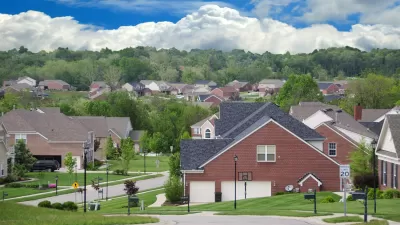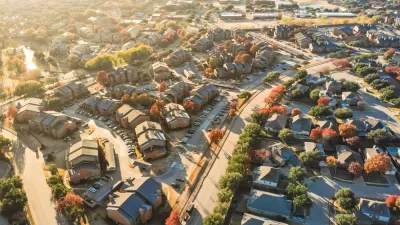In the last three decades HOAs have grown six-fold in the U.S. They now cover 20 percent of American homes, and stifle sustainability and expression through “one of the most significant privatizations of local government functions in history.”

Kaid Benfield unleashes his wrath on America's 323,600 homeowner associations, which "preside over the homes and neighborhoods of an astounding 63.4 million Americans." He details the ways in which such "governing associations" use their powers to stifle expression and sustainable practices, such as planting produce gardens, air-drying clothes, and installing solar panels.
"I use the word “governing” deliberately, because that is very much what HOAs do (and what my condo board did, when I lived in Adams-Morgan)," writes Benfield. "For example, they have taxing power, setting mandatory dues that if not paid can result in the placement of a lien on your property or even foreclosure; they have regulatory authority, setting rules for everything from when you can take out the trash to what color and materials you use in your window treatments to what you can and cannot grow in your yard. They have enforcement power, too, including the right to issue cease and desist orders and to impose financial penalties in the form of fines. One legal observer has called the exercise of quasi-political powers by HOAs 'one of the most significant privatizations of local government functions in history,' pointing out how quickly some of them move to foreclose on private homes because of dues underpayment."
"In a lot of places – probably in most – it’s a sort of government-among-friends, where rules are applied and interpreted with good faith and generosity, where neighbors cooperate on upkeep, and where buildings and communities look better and function better because of it."
"But, in others, homeowners’ associations appear to have more in common with the Soviets than just a communal process."
FULL STORY: Coercion by contract: how homeowners associations stifle expression, sustainability

Planetizen Federal Action Tracker
A weekly monitor of how Trump’s orders and actions are impacting planners and planning in America.

Map: Where Senate Republicans Want to Sell Your Public Lands
For public land advocates, the Senate Republicans’ proposal to sell millions of acres of public land in the West is “the biggest fight of their careers.”

Restaurant Patios Were a Pandemic Win — Why Were They so Hard to Keep?
Social distancing requirements and changes in travel patterns prompted cities to pilot new uses for street and sidewalk space. Then it got complicated.

Platform Pilsner: Vancouver Transit Agency Releases... a Beer?
TransLink will receive a portion of every sale of the four-pack.

Toronto Weighs Cheaper Transit, Parking Hikes for Major Events
Special event rates would take effect during large festivals, sports games and concerts to ‘discourage driving, manage congestion and free up space for transit.”

Berlin to Consider Car-Free Zone Larger Than Manhattan
The area bound by the 22-mile Ringbahn would still allow 12 uses of a private automobile per year per person, and several other exemptions.
Urban Design for Planners 1: Software Tools
This six-course series explores essential urban design concepts using open source software and equips planners with the tools they need to participate fully in the urban design process.
Planning for Universal Design
Learn the tools for implementing Universal Design in planning regulations.
Heyer Gruel & Associates PA
JM Goldson LLC
Custer County Colorado
City of Camden Redevelopment Agency
City of Astoria
Transportation Research & Education Center (TREC) at Portland State University
Camden Redevelopment Agency
City of Claremont
Municipality of Princeton (NJ)





























